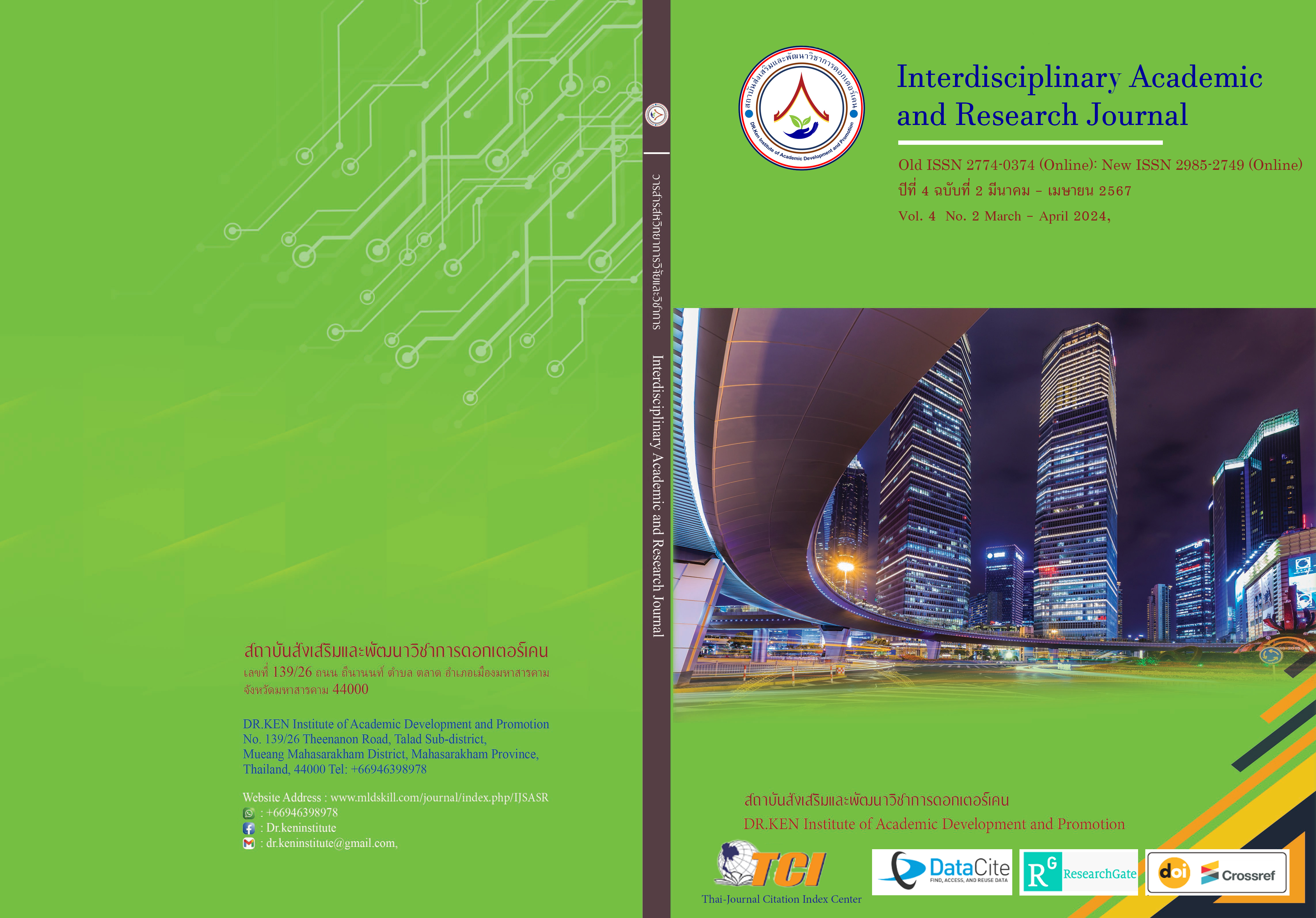Factors Affecting the Operational Efficiency of the Village and Urban Community Fund of Wanon Niwat District Sakon Nakhon Province
DOI:
https://doi.org/10.60027/iarj.2024.274874Keywords:
Operational Efficiency, , Village and Urban Community FundAbstract
Background and Aims: The Village Fund aims to be a source of revolving funds for investment to develop careers, create jobs, generate income, increase income, and reduce expenses, or for promotion and development towards creating welfare or any other common benefits for the people in villages or urban communities. Including being a source of revolving funds to alleviate urgent problems for people in villages or urban communities. Thus, the purposes of this study included the following: 1) To study the level of strategic leadership public participation and efficiency of village and urban community fund operations in Wanonniwat District 2) To study the influence of strategic leadership and public participation that affects the efficiency of village and urban community fund operations in Wanonniwat District.
Methodology: The sample group included village and urban community fund members in Wanonniwat District, in Sakon Nakhon Province, 395 people, used a questionnaire as a tool to collect data. Statistics used in data analysis include frequency, percentage, average, and standard deviation, and multiple regression analysis.
Results: (1) Strategic leadership of village leaders in Wanonniwat District Overall, it is at a high level. People's participation in the village and urban community fund operations of Wanonniwat District. Overall, it is at a high level. and the efficiency of the village and urban community fund operations of Wanonniwat District Overall, it is at a high level. (2) Strategic leadership in controlling the organization in balance (β=.320), acting with morality (β=.315), setting strategic direction (β=.180), and supporting effective organizational culture ( β=.147) has an influence on strategic leadership that affects the operational efficiency of village and urban funds with statistical significance at the .01 level. They were able to jointly predict the operational efficiency level of village and urban funds in Wanonniwat District at 70.80 percent (R2Adj=.708). 3) public participation Participation in receiving benefits (β=.436) and participation in evaluation (β=.178) influence strategic leadership that affects the efficiency of village and urban community fund operations. Statistically significant at the .01 level, participation in decision-making (β=.123) has an influence on strategic leadership that affects the efficiency of village and urban community fund operations. Statistically significant at the .05 level. Together they were able to predict the operational efficiency level of the Village and Urban Fund in Wanon Niwat District at 46.60 percent (R2Adj=.466).
Conclusion: The study illuminates a positive landscape in Wanonniwat District, where strategic leadership among village leaders and active public participation play pivotal roles in driving the high operational efficiency of village and urban community funds. The identified factors, including balanced organizational control, moral conduct, and robust support for organizational culture, underscore the interconnectedness of strategic leadership with effective fund operations. Public involvement, particularly in benefits reception, evaluation, and decision-making processes, further contributes significantly to the overall operational efficiency. These findings collectively underscore the holistic and collaborative nature of leadership and community engagement in ensuring the success of village and urban community fund operations in Wanonniwat District.
References
กิติพงษ์ ไชยปิง. (2560). ความสําเร็จในการบริหารงานกองทุนหมู่บ้าน บ้านหนองตะเคียนบอน หมู่ที่ 3 ตําบลหนองตะเคียนบอน อําเภอวัฒนานคร จังหวัดสระแก้ว .งานนิพนธ์รัฐประศาสนศาสตรมหาบัณฑิตมหาวิทยาลัยบูรพา.
กีรติวรรณ กัลยาณมิตร. (2563). รูปแบบบทบาทที่เหมาะสมของอาสาสมัครและการพัฒนาสุขภาพสู่ความยั่งยืนในจังหวัดสุพรรณบุรี. รายงานการวิจัย มหาวิทยาลัยราชภัฏสวนสุนันทา.
จิราพรรณ สุดลาภา. (2564). วัฒนธรรมองค์การ และภาวะผู้นำเชิงกลยุทธ์ที่ส่งผลต่อการบริหารมุ่งผลสัมฤทธิ์ขององค์กรปกครองส่วนท้องถิ่นในเขตอำเภอเมือง จังหวัดนครพนม. วิทยานิพนธ์รัฐประศาสนศาสตรมหาบัณฑิตมหาวิทยาลับราชภัฏสกลนคร.
จุฑามาศ นิรมลรัตน์. (2560). ปัจจัยความสำเร็จของกองทุนหมู่บ้านอ้อมแก้ว หมู่ที่ 9ตำบลมาบโป่ง อำเภอพานทองจังหวัดชลบุรี. งานนิพนธ์รัฐประศาสนศาสตรมหาบัณฑิต วิทยาลัยการบริหารรัฐกิจ มหาวิทยาลัยบูรพา.
ชนะพงษ์ กล้ากสิกิจ. (2562). ประสิทธิผลการบริหารจัดการกองทุนหมู่บ้านและชุมชนเมืองในจังหวัดกำแพงเพชร. รายงานการวิจัย. นครสวรรค์: มหาวิทยาลัยมหาจุฬาลงกรณราชวิทยาลัย วิทยาเขตนครสวรรค์.
เชวงศักดิ์ พฤกษเทเวศ. (2553). การพัฒนาตัวบ่งชี้ภาวะผู้นำ เชิงกลยุทธ์ของผู้บริหาร สำนักงานเขตพื้นที่การศึกษา. วิทยานิพนธ์ดุษฎีบัณฑิต มหาวิทยาลัยขอนแก่น.
ถวิลวดี บุรีกุล. (2551). คู่มือการมีส่วนร่วมของประชาชน. นนทบุรี: สถาบันพระปกเกล้า.
พรพิงค์ จำปานาค. (2562). การประเมินประสิทธิผลและปัจจัยที่กำหนดผลการดำเนินงานของกองทุนหมู่บ้านและชุมชนเมือง ในจังหวัดสมุทรสงคราม. รายงานการวิจัย ภาควิชาเศรษฐศาสตร์ คณะเศรษฐศาสตร์ มหาวิทยาลัยเกษตรศาสตร์.
พันธิยา ดอกไม้. (2565). ปัจจัยที่ส่งผลต่อความสำเร็จในการดำเนินงานโครงการกองทุนหมู่บ้านและชุมชนเมือง ในเขตอำเภอดอนตาล จังหวัดมุกดาหาร. วิทยานิพนธ์รัฐประศาสนศาสตรมหาบัณฑิตมหาวิทยาลับราชภัฏสกลนคร.
ไพโรจน์ ฦาชา. (2565). การมีส่วนร่วมของประชาชนที่ส่งผลต่อผลสัมฤทธิ์การปฏิบัติงานตามบทบาทหน้าที่ของกำนัน ผู้ใหญ่บ้านในเขตอำเภอบ้านม่วง จังหวัดสกลนคร. วิทยานิพนธ์รัฐประศาสนศาสตรมหาบัณฑิตมหาวิทยาลับราชภัฏสกลนคร.
มณฑนา ยามา. (2561). อิทธิพลของความรู้และการมีส่วนร่วมของประชาชนต่อประสิทธิผลการบริหารจัดการกองทุนหมู่บ้านและชุมชนเมือง ในเขตตำบลกกตูม อำเภอดงหลวง จังหวัดมุกดาหาร. วิทยานิพนธ์รัฐประศาสนศาสตรมหาบัณฑิต มหาวิทยาลัยราชภัฏสกลนคร.
ยศวดี เชื้อวงศ์พรหม. (2563). อิทธิพลของภาวะผู้นำเชิงกลยุทธ์ และวัฒนธรรมองค์การที่ส่งผลต่อประสิทธิภาพขององค์กรปกครองส่วนท้องถิ่น ในเขตอำเภอเมืองสกลนคร จังหวัดสกลนคร. วิทยานิพนธ์รัฐประศาสนศาสตรมหาบัณฑิต: มหาวิทยาลัยราชภัฎสกลนคร.
ศิริขวัญ วิเชียรเพลิศ. (2558). รายงานการศึกษากองทุนหมู่บ้านและชุมชนเมืองแห่งชาติ. กรุงเทพฯ: สำนักงบประมาณของรัฐสภา สำนักงานเลขาธิการสภาผู้แทนราษฎร.
สำนักงบประมาณของรัฐสภา. (2562). การมีส่วนร่วมของประชาชนในกระบวนการงบประมาณ. กรุงเทพฯ: สำนักงบประมาณของรัฐสภาสำนักงานเลขาธิการสภาผู้แทนราษฎร.
สำนักงานกองทุนหมู่บ้านและชุมชนเมืองแห่งชาติ. (2560). คู่มือการดำเนินงานโครงการเพิ่มความเข้มแข็งของเศรษฐกิจฐานรากตามแนวทางประชารัฐ (สำหรับกองทุนหมู่บ้านและชุมชนเมือง). กรุงเทพฯ: สำนักงานกองทุนหมู่บ้านและชุมชนเมืองแห่งชาติ.
สำนักงานพัฒนาชุมชนอำเภอวานรนิวาส จังหวัดสกลนคร. (2564). ฐานข้อมูลของสมาชิกกองทุนหมู่บ้านและชุมชนเมืองในเขตอำเภอวานรนิวาส จังหวัดสกลนคร. สกลนคร: สำนักงานพัฒนาชุมชนอำเภอวานรนิวาส จังหวัดสกลนคร.
สุจิตรา สิงห์หันต์. (2563). ภาวะผู้นำเชิงกลยุทธ์และการมีส่วนร่วมของประชาชนที่ส่งผลต่อประสิทธิผลการบริการภาครัฐของส่วนราชการ ในเขตอำเภอเต่างอย จังหวัดสกลนคร. วิทยานิพนธ์รัฐประศาสนศาสตรมหาบัณฑิตมหาวิทยาลัยสกลนคร.
Arnstein, S. R. (1969). A ladder of citizen participation. Journal of the American Institute of Planners, 35(4), 216–224.
Bass, B. M., & Riggio, R. E. (2006). Transformational leadership (2nd ed.). Psychology Press.
Bryson, J. M., & Crosby, B. C. (1992). Leadership for the common good: Tackling public problems in a shared-power world. Jossey-Bass.
Chowdhury, S. D., & Mahbub, A. (2012). The impact of strategic leadership on organizational outcomes: A study on private hospitals in Bangladesh. International Journal of Business and Management, 7(7), 66–77.
Cohen, J.M., & Uphoff, N.T. (1980). Participation’s Place in Rural Development: Seeking Clarity Through Specificity. World Development.
Den Hartog, D. N., House, R. J., Hanges, P. J., Ruiz-Quintanilla, S. A., & Dorfman, P. W. (1999). Culture-specific and cross-culturally generalizable implicit leadership theories: Are attributes of charismatic/transformational leadership universally endorsed? Leadership Quarterly, 10(2), 219–256.
Fisman, R., & Miguel, E. (2007). Corruption, norms, and legal enforcement: Evidence from diplomatic parking tickets. Journal of Political Economy, 115(6), 1020–1048.
Hitt, M. A., Ireland, R. D., & Hoskisson, R. E. (2007). Strategic Management—Competitiveness and Globalization: Concepts and Cases. Thomas Higher Education.
Pretty, J. (1995). Participatory learning for sustainable agriculture. World Development, 23(8), 1247–1263.
Ribot, J. C. (2002). Democratic decentralization of natural resources: Institutionalizing popular participation. World Resources Institute.
Yamane T. (1981). Statistle and Introductory Analysis. 3rd ed. New York: Harper and Row.
Downloads
Published
How to Cite
Issue
Section
License
Copyright (c) 2024 Interdisciplinary Academic and Research Journal

This work is licensed under a Creative Commons Attribution-NonCommercial-NoDerivatives 4.0 International License.
Copyright on any article in the Interdisciplinary Academic and Research Journal is retained by the author(s) under the under the Creative Commons Attribution-NonCommercial-NoDerivatives 4.0 International License. Permission to use text, content, images, etc. of publication. Any user to read, download, copy, distribute, print, search, or link to the full texts of articles, crawl them for indexing, pass them as data to software, or use them for any other lawful purpose. But do not use it for commercial use or with the intent to benefit any business.
















.png)


